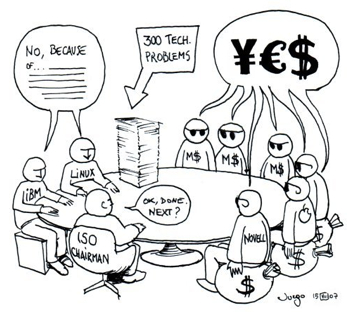Microsoft claims victory in ISO struggle over OOXML


The e-mail reads in part:
While the final vote has not yet been announced formally, publicly available information shows overwhelming support for Open XML. According to documents available on the Internet, 86% of all national body members support ISO/IEC standardization, well above the 75% requirement for formal acceptance under ISO and IEC rules. In addition, 75% of the Participating national body members (known as P-members) support standardization, also well above the required 66.67% requirement for this group.
Open XML, IS29500, now joins HTML, PDF and ODF as ISO- and IEC-recognized open document format standards.
That last is important. PDF is a format which is proprietary to Adobe Corp. Microsoft is essentially saying the two decisions are identical.
But they are not, not politically. In order to win ratification for OOXML, Microsoft esssentially corrupted the ISO standards process.
This is worse than the alleged stretching of the Constitution done by the current Administration. Constitutions can be changed, or changed back. Once a standard is ratified, it's ratified for all time.
And once a method for corruption has been shown to work, it will be used again, by people whose motives are less pure.
My problem here is not with Microsoft. I know for certain that Steve Ballmer is a great and good man. But history shows once a way to power is shown by the good, it will be followed by the bad.
If a Chinese or a Russian or a Brazilian business seeks to impose a royalty-bearing, proprietary standard on users in the future, what can the U.S. say in response?
Nothing.